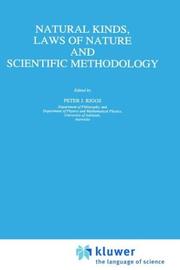| Listing 1 - 5 of 5 |
Sort by
|

ISBN: 0792342259 9048147506 9401586071 9780792342250 Year: 1996 Volume: 12 Publisher: Dordrecht Kluwer
Abstract | Keywords | Export | Availability | Bookmark
 Loading...
Loading...Choose an application
- Reference Manager
- EndNote
- RefWorks (Direct export to RefWorks)
Science --- Philosophy. --- History. --- Methodology. --- -Science --- -Natural science --- Science of science --- Sciences --- History --- Methodology --- Philosophy --- -History --- Normal science --- Philosophy of science --- Scientific method --- Logic, Symbolic and mathematical --- Science - Philosophy. --- Science - History. --- Science - Methodology.
Book
ISBN: 9048184975 9048124026 9786612236921 128223692X 9048124034 Year: 2009 Publisher: Dordrecht : Springer Netherlands : Imprint: Springer,
Abstract | Keywords | Export | Availability | Bookmark
 Loading...
Loading...Choose an application
- Reference Manager
- EndNote
- RefWorks (Direct export to RefWorks)
This is a treatise devoted to the foundations of quantum physics and the role that causality plays in the microscopic world governed by the laws of quantum mechanics. There is no sharp dividing line between physics and philosophy of physics. This is especially true for quantum physics where debate on its interpretation and the status of the various entities postulated has raged in both the scientific and philosophical communities since the 1920s and continues to this day. Although it is readily granted that quantum mechanics produces some strange and counter-intuitive results, it is argued in Quantum Causality that quantum mechanics is not as weird as we might have been led to believe. The dominant theory of quantum mechanics is called Orthodox Quantum Theory (also known as the Copenhagen Interpretation). Orthodox Quantum Theory is a ‘theoretical tool’ for making predictions for the possible results of experiments on quantum systems and requires the intervention of an observer or an observer’s proxy (e.g. a measuring apparatus) in order to produce predictions. Orthodox Quantum Theory does away with the notion of causality and denies the existence of an underlying quantum realm. The Causal Theory is not well known within the physics community and many physicists who do know of it are generally dismissive in their attitudes. This is a historical legacy inherited by the majority of the physics community from the most influential founders of quantum mechanics, Niels Bohr and Werner Heisenberg. They both denied the independent existence of a quantum level of reality and declared that causality does not apply to quantum events. Quantum Causality shows that the Causal Theory of Quantum Mechanics is a viable physical theory that provides realistic explanations for quantum phenomena. Much of what is argued for in this book will be controversial but, at the very least, these arguments will likely engender some lively debate on the various issues raised.
Quantum theory. --- Quantum theory --- Causality (Physics) --- Atomic Physics --- Philosophy --- Physics --- Philosophy & Religion --- Physical Sciences & Mathematics --- Causality --- Quantum dynamics --- Quantum mechanics --- Quantum physics --- Philosophy. --- Philosophy and science. --- Quantum physics. --- Philosophy of Science. --- Quantum Physics. --- Heisenberg uncertainty principle --- Nuclear physics --- Mechanics --- Thermodynamics --- Science --- Normal science --- Philosophy of science --- Science and philosophy
Book
ISBN: 9789048124022 Year: 2009 Publisher: New York Springer
Abstract | Keywords | Export | Availability | Bookmark
 Loading...
Loading...Choose an application
- Reference Manager
- EndNote
- RefWorks (Direct export to RefWorks)
Book
ISBN: 9789048124039 Year: 2009 Publisher: Dordrecht Springer Netherlands
Abstract | Keywords | Export | Availability | Bookmark
 Loading...
Loading...Choose an application
- Reference Manager
- EndNote
- RefWorks (Direct export to RefWorks)
This is a treatise devoted to the foundations of quantum physics and the role that causality plays in the microscopic world governed by the laws of quantum mechanics. There is no sharp dividing line between physics and philosophy of physics. This is especially true for quantum physics where debate on its interpretation and the status of the various entities postulated has raged in both the scientific and philosophical communities since the 1920s and continues to this day. Although it is readily granted that quantum mechanics produces some strange and counter-intuitive results, it is argued in Quantum Causality that quantum mechanics is not as weird as we might have been led to believe. The dominant theory of quantum mechanics is called Orthodox Quantum Theory (also known as the Copenhagen Interpretation). Orthodox Quantum Theory is a theoretical tool' for making predictions for the possible results of experiments on quantum systems and requires the intervention of an observer or an observer's proxy (e.g. a measuring apparatus) in order to produce predictions. Orthodox Quantum Theory does away with the notion of causality and denies the existence of an underlying quantum realm. The Causal Theory is not well known within the physics community and many physicists who do know of it are generally dismissive in their attitudes. This is a historical legacy inherited by the majority of the physics community from the most influential founders of quantum mechanics, Niels Bohr and Werner Heisenberg. They both denied the independent existence of a quantum level of reality and declared that causality does not apply to quantum events. Quantum Causality shows that the Causal Theory of Quantum Mechanics is a viable physical theory that provides realistic explanations for quantum phenomena. Much of what is argued for in this book will be controversial but, at the very least, these arguments will likely engender some lively debate on the various issues raised.
Theory of knowledge --- Philosophy of science --- Quantum mechanics. Quantumfield theory --- quantumfysica --- epistomologie
Digital

ISBN: 9789048124039 Year: 2009 Publisher: Dordrecht Springer Netherlands
Abstract | Keywords | Export | Availability | Bookmark
 Loading...
Loading...Choose an application
- Reference Manager
- EndNote
- RefWorks (Direct export to RefWorks)
Theory of knowledge --- Philosophy of science --- Quantum mechanics. Quantumfield theory --- quantumfysica --- epistomologie
| Listing 1 - 5 of 5 |
Sort by
|

 Search
Search Feedback
Feedback About
About Help
Help News
News